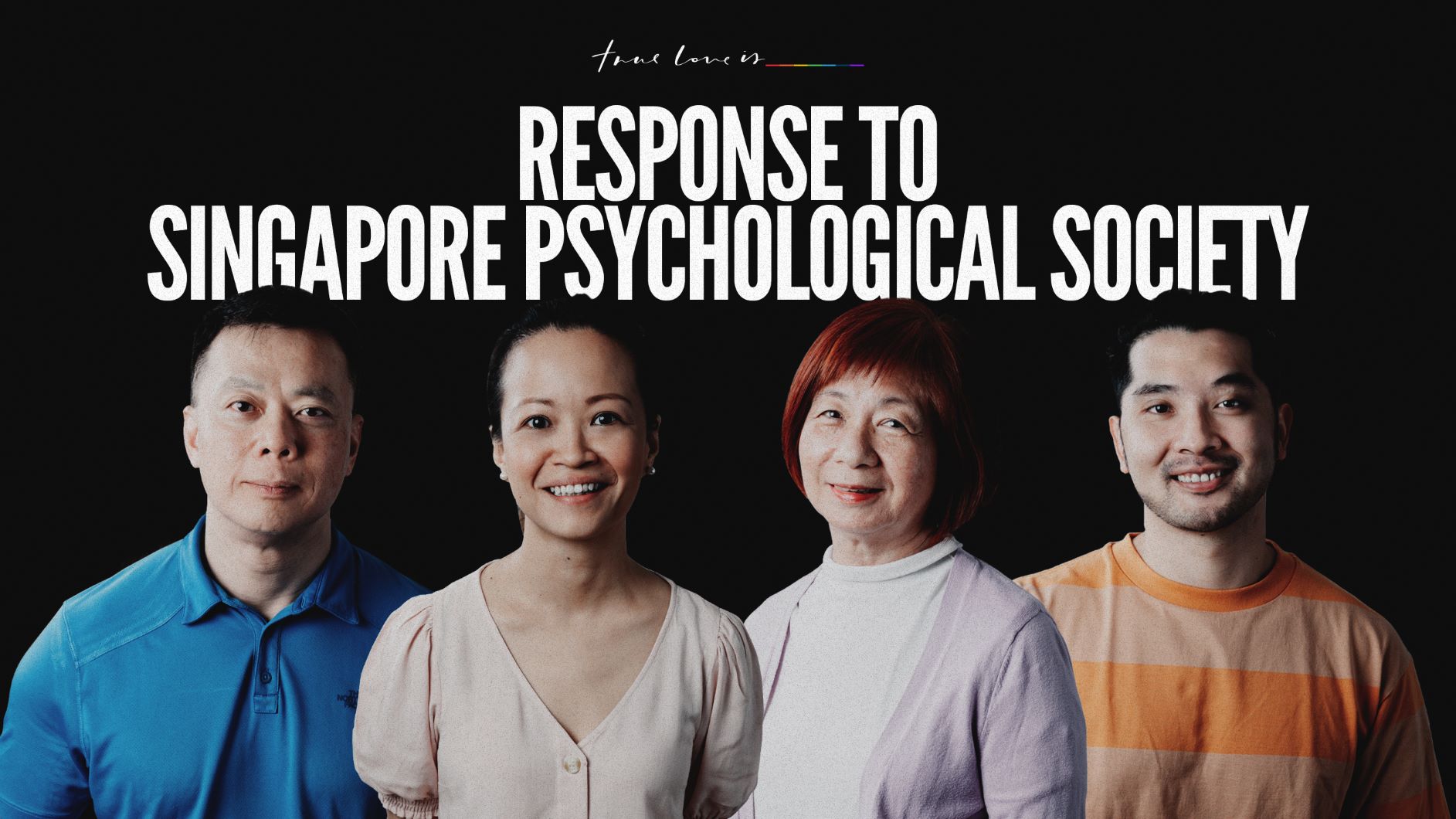Singapore Psychological Society’s comments on “religious techniques”, including prayer, of “deep concern”, say commentators
by Janice Tai // July 6, 2021, 5:44 pm

“As a psychological association, SPS seems to be unfairly painting all forms of religious help for people struggling with same-sex attraction or gender identity issues to be ‘practising conversion therapy’," said TrueLove.Is.
Church leaders have expressed “deep concern” over statements made by the Singapore Psychological Society (SPS) on “conversion therapy” related to the LGBT community.
Said TrueLove.Is, a ministry of 3:16 Church, on its website and social media accounts: “As an ideological/political advocacy coming from a professional body, (it) is troubling.”
In response to recent news that a bill banning LGBTQ “conversion therapies” passed Canada’s House of Commons, SPS put out a social media post on conversion therapy on June 30, saying it “stands with every single person for their deepest ‘self” (ie who they really experience and identify themselves as).”
“In particular, we honour the LGBTQ+ population who have suffered deeply, and who we deeply cherish just as they are,” said the SPS as it also cited “current scientific evidence” on conversion therapy.
In the post, “conversion therapy” is defined as “varied psychological and therapeutic interventions with the primary aim of altering one’s sexual orientation from homosexual or bisexual to one that is primarily heterosexual”. It identified “common techniques in conversion therapy” as “behavioural techniques, e.g. masturbatory reconditioning, aversive conditioning, abstinence training”, “cognitive techniques, e.g. cognitive restructuring, ‘gender lessons’” and “religious techniques, e.g. prayer, reliance on higher power to change orientation”.
However, the SPS says they are not calling for a ban on “conversion therapy”.
Calls for dialogue
In its response, TrueLove.Is (TLi), a ministry which provides stories and resources for Christians who want to know more about LGBTQ issues, reiterated that it is not out to change anyone’s sexual orientation and that it condemns all forms of coercive, manipulative and abusive practices guised in the name of “therapy” with the goal of changing a person’s sexual orientation.
“As a psychological association, SPS seems to be unfairly painting all forms of religious help for people struggling with same-sex attraction or gender identity issues to be ‘practising conversion therapy’. This could not be further from the truth,” said TLi.
“As an ideological/political advocacy coming from a professional body, (it) is troubling.”
“We would like to encourage the SPS to dialogue with various religious groups and better understand how religious groups can help voluntary individuals struggling with LGBTQ issues in a consent-based, ‘non-affirming’ way without ‘conversion therapy’,” it added.
Similarly, former civil servant Jason Wong, known for founding two national movements, the Yellow Ribbon Project and the Dads for Life movement, also asked for an audience with the SPS to seek to understand its perspectives.
“The suggestion from SPS that ‘prayers’ or ‘reliance on a higher power’ can be harmful is surprising. Has SPS had any dialogues with religious leaders? What about people who identified as LGBTQ+ who say that they have been helped by religious teachings and practices?
“If people voluntarily seek advice and prayer from their religious leaders on issues of sexual orientation or gender identity and the religious leaders offer advice and prayer, does that amount to ‘conversion therapy’?” Wong asked in a Facebook post.
The SPS post concluded that current research indicates the “inefficacy and possible harmful effects of conversion therapy”, and recommended “evidence-based therapy” for clients struggling with their sexual orientation and/or gender identity, which it defined as including “exploring and affirming their orientation/identity, exploring assumptions and goals that may have originated from societal pressures, managing stress, and promoting wellbeing”.
TLi said the flaws of an “affirmation-only” approach to gender identity issues are ignored in their statement, and gave the example of a high-profile legal suit in the United Kingdom taken by a detransitioned woman, Keira Bell, against a gender clinic.
“If people voluntarily seek advice and prayer from their religious leaders on issues of sexual orientation … does that amount to ‘conversion therapy’?”
Bell, who was female at birth, began taking puberty blockers at 16 and testosterone at 17 and had a double mastectomy at 20. She later transitioned back to being female.
After three one-hour-long appointments, Bell said she was prescribed puberty blockers, which delay the development of signs of puberty, like periods or facial hair. She felt there was not enough investigation or therapy before she arrived at that stage.
“I should have been challenged on the proposals or the claims that I was making for myself … And I think that would have made a big difference as well … I was allowed to run with this idea that I had, almost like a fantasy, as a teenager … and it has affected me in the long run as an adult,” said Bell.
The High Court ruled in her favour, deciding that under-16s were unlikely to be able to give informed consent to what it described as “experimental” treatment, which is sometimes used to pause puberty in children experiencing gender dysphoria.
Said TLi: “We are all more than our feelings, and we know that sometimes our feelings can lead us astray. Being blindly affirmed on our feelings and desires and told that alternatives are impossible does not help us process our thoughts and feelings constructively.”
TLi also pointed out that there are studies that show how Sexual Orientation Change Efforts (SOCE) significantly help people who voluntarily seek help to reduce unwanted same-sex attraction.
Core self
In response to the SPS point that current research indicates the “inefficacy and possible harmful effects of conversion therapy”, Wong pointed to the 2009 American Psychological Association Task Force Report on “Appropriate Therapeutic Responses to Sexual Orientation” and noted that, while there were “perceptions of harm” of SOCE, these were countered by accounts of “perceptions of relief, happiness, improved relationships with God, and perceived improvement in mental health status, among other reported benefits” arising from SOCE.
In addition, the report also observed that there was a “dearth of scientifically sound research on the safety of SOCE”.
Yesterday (July 5), the SPS released a statement to clarify its previous social media post. It said in its statement that when it recommended that psychologists use evidence-based therapy, including “exploring and affirming” clients’ sexual orientation, it is referring to the appropriate application of “affirmative” therapy as outlined by the American Psychological Association (APA, 2009).
“This involves ‘therapist acceptance, support and understanding of clients, and the facilitation of clients’ active coping, social support, and identity exploration and development, without imposing a specific sexual orientation identity outcome’.
“This neither encourages nor discourages clients to identify a particular way with regard to their sexual orientation,” said SPS.
Yesterday (July 5), the SPS released a statement to clarify its previous social media post.
“Our recommendation only applies to psychological practice in the treatment of our clients. Any other forms of intervention outside of the psychological setting are not under our purview. This statement does not seek to have any bearing over political or religious beliefs and practices. It is not in SPS’ position to call for a ban on SOCE,” it added.
Lawyer Darius Lee, who has published journal articles on conversion therapy bans in the Singapore Academy of Law Journal and Public Discourse, wrote in a blog post that the SPS’ clarification, when read alongside its first post, poses readers with a number of gaps and contradictions.
While SPS’s “affirmative” approach “neither encourages nor discourages clients to identify a particular way with regard to their sexual orientation”, its “clarification” also mainly used the term SOCE.
SOCE is a term defined by the American Psychological Association Task Force in the 2009 report – cited by the SPS – as “methods … that aim to change a person’s same-sex sexual orientation to other-sex,” noted Lee.
He added that SPS’ original post against “religious techniques, e.g. prayer, reliance on higher power to change orientation” remains unaddressed.
Lee, who is an associate director at Characterist LLC, also observed that SPS endorsed the “minority stress” model in its original post, attributing disproportionate issues with “mental health and wellbeing of LGBTQ+ people” to “prejudice and intolerance in a hostile social context”.
“We believe our primary, authentic self lies in being a beloved child of God.”
“Accordingly, SPS recommended the focus of psychological treatment to target these factors that lead to the increased risks of mental health problems rather than the individuals’ ‘identity’ per se,” said Lee, in highlighting some of the gaps and contradictions raised by the SPS clarification when read alongside its first post.
He suggested that what appears on the surface to be a debate over the stance of a professional institution towards certain practices regarding changing a person’s sexual orientation, or gender identity, is actually a deeper debate over the question: Who am I?
“On the one hand, there are those who agree with the SPS that a person’s ‘deepest self’ is ‘who they deeply experience and identify themselves as’ including on matters of sexual orientation or gender identity,” wrote Lee.
“On the other, there are those – such as Christians or Muslims – who believe in the embodied nature of the ‘self’, and the importance of biology to human identity and relationships, such as marriage and family.”
TLi said there are Christians with LGBTQ+ stories who do not see their sexuality or gender identity to be their core self, and instead want to pursue being their authentic self by living a life that is congruent with their deeply-held religious beliefs. Therefore, their right to seek help from competent professionals and religious leaders of their choice should be supported.
“We believe our primary, authentic self lies in being a beloved child of God. Our desire to pursue God can, and should, be above all other desires – including LGBTQ desires.”
RELATED STORIES:
How can the church respond better to those with same-sex attraction?
We are an independent, non-profit organisation that relies on the generosity of our readers, such as yourself, to continue serving the kingdom. Every dollar donated goes directly back into our editorial coverage.
Would you consider partnering with us in our kingdom work by supporting us financially, either as a one-off donation, or a recurring pledge?
Support Salt&Light


